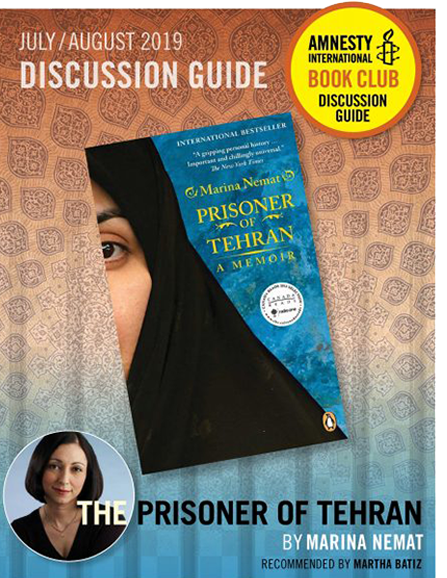by Marina Nemat

Recommended by Martha Batiz
In 1982, 16-year-old Marina Nemat was arrested on false charges by Iranian Revolutionary Guards and tortured in Tehran’s notorious Evin prison. At a time when most Western teenaged girls are choosing their prom dresses, Nemat was having her feet beaten by men with cables and listening to gunshots as her friends were being executed. She survived only because one of the guards fell in love with her and threatened to harm her family if she refused to marry him. Soon after her forced conversion to Islam and marriage, her husband was assassinated by rival factions. Nemat was returned to prison but, ironically, it was her captor’s family who eventually secured her release. An extraordinary tale of faith and survival, Prisoner of Tehran is a testament to the power of love in the face of evil and injustice.
Click below to download the discussion guide.
About Martha Batiz

Martha Batiz was born and raised in Mexico City, but has been living in Toronto since 2003. Her articles, chronicles, reviews and short stories have appeared in diverse newspapers and magazines not only in her homeland, but also in Spain, Dominican Republic, Puerto Rico, Costa Rica, Peru, Ireland, England, the United States and Canada. She’s the author of two short-story collections in Spanish: A todos los voy a matar (I’m Going To Kill Them All, Castillo Press, Mexico, 2000), and De tránsito (In Transit, Terranova Editores, Puerto Rico, 2014). Her award-winning novella The Wolf’s Mouth (Exile Editions, 2009) was originally published in Spanish both in the Dominican Republic and in Mexico (Boca de lobo, in 2007 and 2008, respectively), later it was launched as an e-book by INK Press (2015) and most recently, a new print edition was launched by Lugar Común Editorial (2019). Boca de lobo appeared in the spring of 2018 in French translation as La Gueule du Loup (Lugar Común Editorial), and was released again in its English version in November 2018 as Damiana’s Reprieve (Exile Editions). In total, this novella has had seven different editions, in three different languages. Martha’s latest short-story collection, titled Plaza Requiem: Stories at the Edge of Ordinary Lives (Exile Editions, 2017), was the sole nominee for the 2018 International Latino Book Award in the category of “Best Popular Fiction: English.” In 2014, Martha was featured in Latinos Magazine among the Top Ten Most Successful Mexicans in Canada. In 2015, she was chosen as one of the Top Ten Most Influential Hispanic-Canadians.
Martha’s Thoughts on the Booknew Tab
Prisoner of Tehran, Marina Nemat’s brave and insightful memoir, was published over ten years ago, but it continues to amaze me. I never miss the chance to recommend it, as the author’s example of resilience and unbreakable spirit is truly inspiring. In this book, Nemat shares her life as a child and teenager in Iran, focusing on how the Islamic Revolution that overthrew the Shah, and brought Ayatolla Khomeini into power, shattered her life. At 16 years old, she was arrested, tortured, jailed, condemned to death, and then saved by her torturer only be forced to convert to Islam, marry him under duress, and suffer even more before she was finally freed a little over two years later.
When I read Prisoner of Tehran for the first time I remember thinking, in shame, what a carefree 16-year-old I had been, indifferent to politics and blissfully free to express my views and enjoy myself (like most adolescents in countries that enjoy the luxury of peace). Marina Nemat, in contrast, was painfully aware of the changes taking over her country, and decided to fight back without realizing the terrible consequences she would face. Nemat was imprisoned in the infamous Evin prison, from which few people come out alive to tell their story. It actually took her eighteen long years of silence, nightmares, guilt, and pain to be ready to share hers with the world.
Marina Nemat’s grandparents first arrived in Tehran from Russia in the early 20th century, in order to work in the construction of a royal palace. The Russian Revolution erupted while they were in Tehran and they decided to make that new country their home. Thus, Marina grew up speaking Russian with her grandmother, Persian with her parents, and reading books in English for fun—and to escape her loneliness. Her childhood transpired between her family’s apartment in Tehran and their cottage by the Caspian Sea. In her book, the chapters where she talks about those days by the shore offer some very necessary respite from the stress and tension related to her life immediately before and during Evin.
Marina’s fate changed when, after the Islamic Revolution, Revolutionary Guards replaced the teachers at her high school (a school for the local Zoroastrian minority). The Guards had instructions to teach the Koran instead of the regular academic subjects. Marina, however, wanted to attend university and have a career. She demanded to be taught what she was supposed to be taught, according to the curriculum. The “teacher” asked her to leave the classroom. She did, and her classmates followed her. This had not been her plan, but her actions unleashed a school-wide student strike, which landed her on a governmental black list. A few days later, her nightmare began.
I grasped the immensity of Marina Nemat’s tragedy when my own twin daughters turned 16. I looked at them and thought, in horror, Marina was just like them when she was imprisoned, tortured, raped, almost killed, and when she watched so many of her friends die. How can someone survive all that and not be resentful and bitter? Prisoner of Tehran holds the answer, which is one of the book’s most valuable lessons. In spite of her suffering, Marina speaks about her past with forgiveness, and grace. If she learned something from her time in prison, she has said, is that no one is completely evil, not even the man who was in charge the evening the plants of her feet were torn apart by the force of endless lashing, and who later coerced her into marrying him —in the end, she owes her life to him.
Because I grew up in Mexico and, until only a few years ago, Iran never had a huge presence in Latin American news, there were many things about life in that country that I did not know until I read Prisoner of Tehran. For example, the fact that women can be jailed or even beaten to death for having a streak of hair showing from underneath their hijab or chador. Or that male jail guards may marry a prisoner, under Sharia Law, in order to have “lawful sex” with her (which is, of course, a euphemism for rape), and then get a divorce the next morning. I agree with Marina Nemat, now a renowned activist: the human rights abuses that take place in Iran deserve continous attention and condemnation. They must end.
Prisoner of Tehran was written not only because Marina felt the personal need to let her painful memories flow, but because she is concerned—as we, as readers and citizens of the world, should be—that this brutality keeps on happening. Evin is still fully operational and people are killed within its walls every single day. The book is actually dedicated to Zahra Kazemi, the talented Iranian-Canadian journalist who was murdered in Evin.
One of the most poignant moments in the book is when Marina introduces us to Sarah who, as a way of coping with the loss of her brother, starts writing down her memories of their childhood by the Caspian Sea… on her own body. Her desire to capture the past, to hold on to the joy they once knew, proves stronger than the lack of paper. And because that desperate action is now forever captured within the pages of Prisoner of Tehran, Sarah and her brother will no longer be forgotten.
Prisoner of Tehran is a fair and moving tribute to all those brave young Persians who fought injustice and were murdered by what is still one of the most violent regimes in the world. Every time Prisoner of Tehran is read, the memory of these innocent victims is brought to life; their sacrifice no longer feels to have been made in vain. Through Marina’s painful, yet beautifully written testimony, we are reminded that peace, justice, and liberty are precious, yet fragile. And that we must never take them for granted.
About the Author
Marina Nemat

Marina Nemat was born in 1965 in Tehran, Iran. After the Islamic Revolution of 1979, she was arrested at the age of sixteen and spent more than two years in Evin, a political prison in Tehran, where she was tortured and came very close to execution. She came to Canada in 1991 and has called it home ever since. Her memoir of her life in Iran, Prisoner of Tehran, was published in Canada by Penguin Canada in 2007, has been published in 28 other countries, and has been an international bestseller. In 2007, Marina received the inaugural Human Dignity Award from the European Parliament and, in 2008, the Grinzane Prize in Italy. She was the recipient of the Morris Abram Human Rights Award from UN Watch in Geneva, Switzerland, in 2014. In February 2017, she received Premio Ceppo Pistoia, a prestigious award given every year in Tuscany, Italy. In 2008/2009, she was an Aurea Fellow at University of Toronto’s Massey College, where she wrote her second book, After Tehran: A Life Reclaimed, published in 2010. Marina regularly speaks at high schools, universities, and conferences around the world, including University of Milan, Oxford University, Yale, Tufts, Berkeley, and Stanford. She was a member of the Board of Directors at the CCVT (Canadian Centre for Victims of Torture) from 2012 to 2019 and is a member of the Board at Vigdis, a Norwegian charitable organization that provides legal and other forms of assistance to female political prisoners around the world. In addition, she is the chair of Writers in Exile at PEN Canada, and a member of the International Council of the Human Rights Foundation in the U.S. She has a Certificate in Creative Writing from the School of Continuing Studies at University of Toronto and currently teaches memoir writing at the SCS. In 2014, she was a recipient of the Excellence in Teaching Award at the School. She’s also a senior fellow at the Raoul Wallenberg Centre for Human Rights. Occasionally, she writes book reviews and opinion pieces for various publications.











